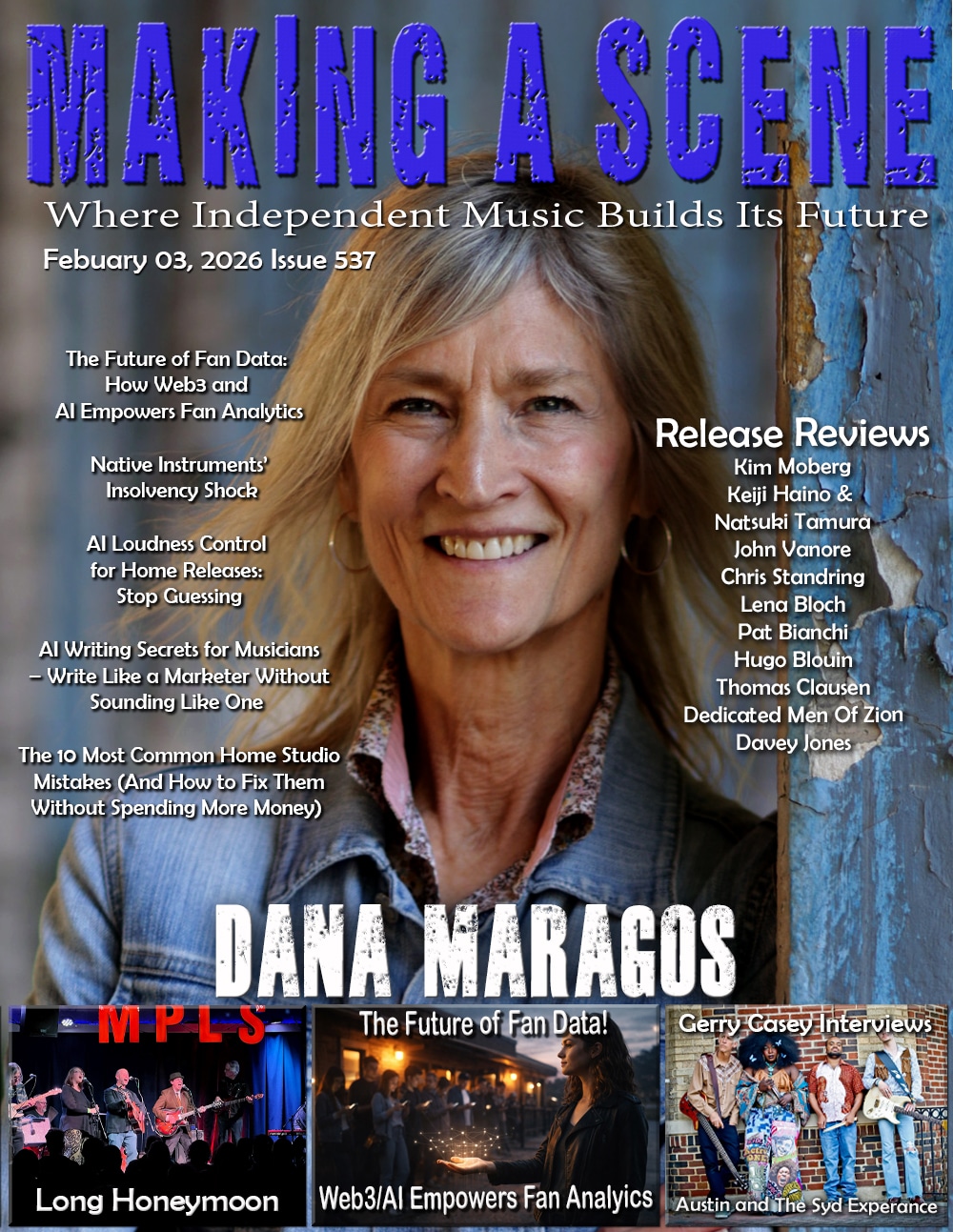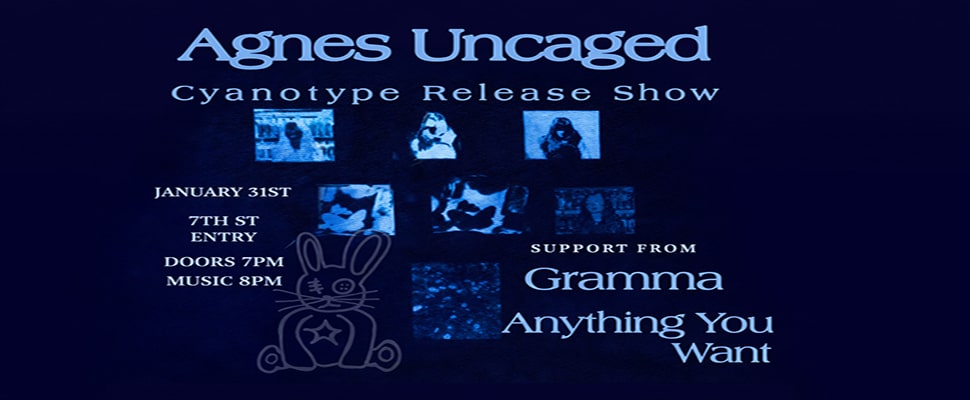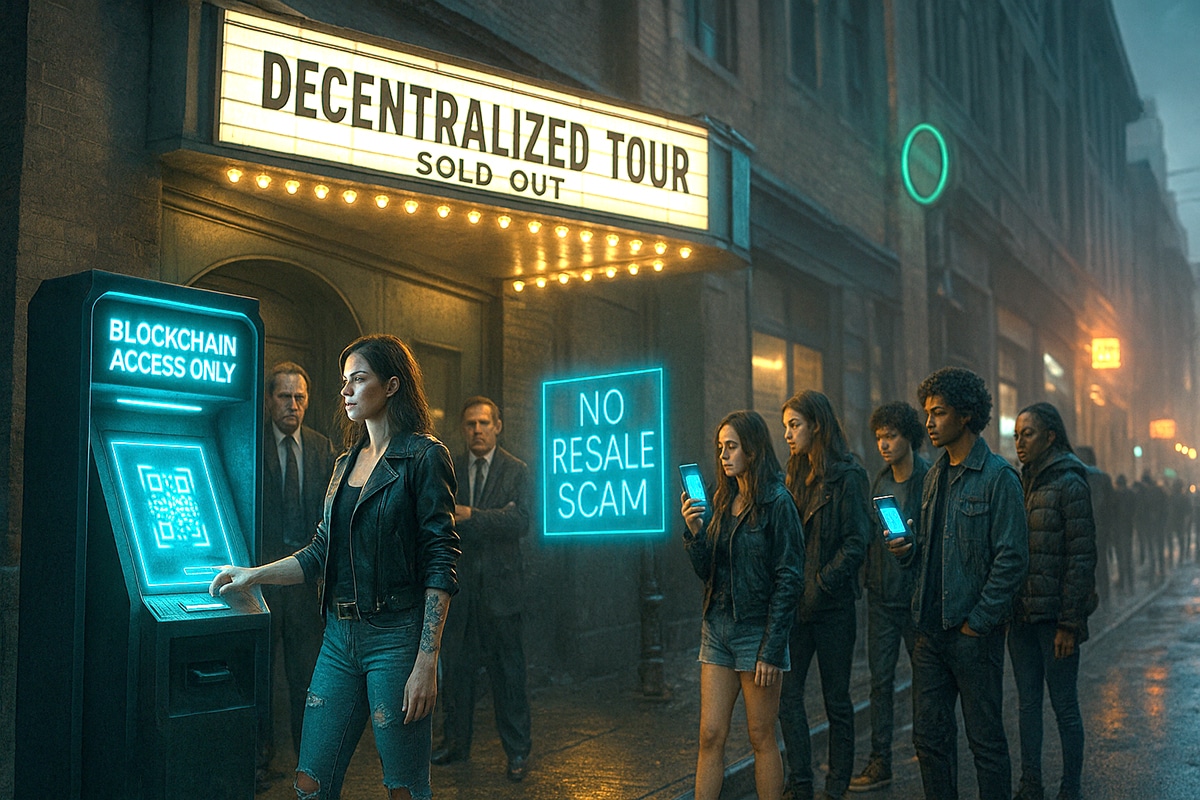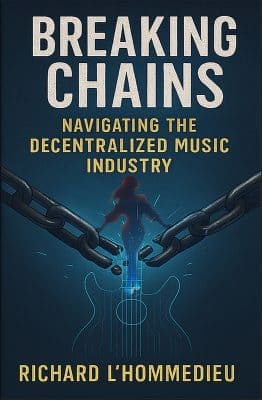Decentralized Touring: How Blockchain Ticketing Stops Scalpers and Builds Fan Loyalty
Making a Scene Presents – Decentralized Touring: How Blockchain Ticketing Stops Scalpers and Builds Fan Loyalty
If you’ve ever tried to buy a concert ticket for a big show, you know the feeling. You wait for the exact minute tickets go on sale, click “Buy” as fast as you can, and somehow they’re gone in seconds. Moments later, the same tickets are listed on resale websites for triple or even ten times the price. It’s frustrating for fans, and it’s just as frustrating for artists. Instead of going to real supporters, tickets end up in the hands of scalpers—people who buy them just to resell for profit.
For independent artists, this problem might seem like something that only happens to big names like Taylor Swift or Beyoncé. But the truth is, scalpers can and do target smaller shows too, especially if you have a loyal fan base in your hometown or on tour. And even if you’re not selling out stadiums yet, learning how to control your ticket sales now can set you up for a stronger touring business in the future.
That’s where decentralized ticketing comes in. Using blockchain technology and NFTs (non-fungible tokens), artists now have a way to make sure their tickets go to real fans, not scalpers. Even better, this technology can give you new ways to connect with your audience, reward loyalty, and earn more money from your shows.
Let’s break down how this works, why it matters, and how you—yes, even as an indie artist—can start using it today.
The Problem with Traditional Ticketing
The current ticketing system is controlled by a few giant companies like Ticketmaster and AXS. They act as middlemen between you and your fans. That means you often have little control over who buys your tickets, how much they sell for on resale, or how the fan experience is handled.
When tickets are released, scalpers use bots—automated programs that can buy thousands of tickets faster than any human—to scoop them up in bulk. Then they list them on resale sites for outrageous prices. Fans either pay way more than they should or miss the show entirely. Meanwhile, artists don’t see a cent of that extra money.
Even if you’re using smaller ticketing platforms like Eventbrite, Dice, or See Tickets, there’s still a risk of reselling and fake tickets. And in many cases, once the ticket is sold, you have no way to track where it goes or who actually shows up.
How Blockchain Ticketing Works
Blockchain is basically a super secure digital ledger—a record of transactions that can’t be changed or erased. When you sell a ticket as an NFT, it’s recorded on the blockchain. This means every single ticket has a unique digital identity, and you can track it from the moment it’s sold until the moment it’s scanned at the venue.
Because each ticket is unique and tied to the buyer’s digital wallet, it’s much harder for scalpers to hoard tickets or sell fake ones. You, the artist, can also set rules for resale. For example, you can say, “If this ticket gets resold, it can only be for the same price or less,” or “If it gets resold, 20% of that sale comes back to me.” These rules are baked into the ticket itself through smart contracts, which automatically enforce them.
NFT tickets also allow you to store extra perks for your fans right inside the ticket—things like exclusive merch discounts, VIP access, or a downloadable live recording of the show. This transforms the ticket from just a piece of paper (or a PDF) into a long-term collectible and fan engagement tool.
Why This Is a Game-Changer for Indie Artists
If you’re an independent artist, you’re already juggling a lot—writing songs, recording, promoting, booking shows, and maybe even working a day job. The last thing you need is to lose money and trust because scalpers are flipping your tickets. NFT-based ticketing can protect your fans, build stronger relationships, and put more money in your pocket.
With blockchain ticketing, you control the rules. You decide how tickets are priced, how many each person can buy, whether they can be resold, and if so, at what price. You can also collect fan data directly—email addresses, wallet IDs, and more—without relying on a middleman to share that info.
And here’s the best part: you can use this data to create fan loyalty programs. For example, if someone buys tickets to three of your shows in a year, you can automatically send them an NFT that gives them early access to your next tour or a special meet-and-greet. You can reward your real supporters and make them feel like insiders.
How It Can Change Touring at the Top Level
For major artists, the benefits are huge too. We’ve already seen some big names experiment with NFT ticketing, including Kings of Leon and The Chainsmokers. At that level, the main goal is to cut scalpers out entirely and make sure fans aren’t getting ripped off. But it’s also about giving fans something beyond just a show—a collectible, a backstage experience, or a membership in an artist’s inner circle.
If enough big and small artists adopt blockchain ticketing, it could completely shift the touring business. Imagine a future where every ticket is an NFT, resale prices are capped, and fans actually trust the buying process. That’s the kind of change that puts the power back in the hands of creators and their audiences.
Real-World NFT Ticketing Platforms You Can Use
You don’t have to wait for the industry to catch up. There are already platforms that make NFT ticketing accessible for independent artists. Here are some of the most notable ones:
SeatlabNFT – A blockchain-based ticketing platform that focuses on eliminating scalpers and rewarding fan loyalty.
Tokenproof – While often used for NFT-based event access, Tokenproof can be adapted for music shows, especially if you already have an NFT fan community.
GUTS Tickets – Based on the GET Protocol, GUTS uses blockchain to make ticketing transparent and secure.
OpenTicket – A full ticketing infrastructure built for NFT ticketing, used by different ticket vendors around the world.
Tixel – While not fully blockchain-based, Tixel integrates resale controls and could be used alongside NFT verification. Website: https://tixel.com
How to Add NFT Ticketing to Your Touring Business Plan
Let’s walk through what this might look like for you as an indie artist.
First, you decide which platform fits your needs. If you want something straightforward and music-focused, YellowHeart or SeatlabNFT are great starting points. If you want more control over the tech, you could explore GET Protocol or even build your own smart contract.
Next, you set up your event. Just like with Eventbrite, you’ll create an event page, set the ticket prices, and decide how many to sell. But here’s where blockchain makes it different—you also set your resale rules and any extra perks you want to include. This is where you can get creative. Maybe each ticket comes with a unique piece of digital art related to your album. Or maybe it unlocks a short video message from you after the show.
When fans buy tickets, they’ll receive them in their digital wallets. If they don’t already have a wallet, most NFT ticketing platforms will walk them through setting one up. This might sound complicated, but think of it like teaching fans to use PayPal or Apple Pay for the first time—it’s a one-time setup that opens the door to lots of future perks.
At the venue, scanning is just as easy as regular ticketing. Fans show a QR code or connect their wallet to verify they own the NFT ticket. Once scanned, the blockchain updates to show the ticket has been used, so it can’t be reused or faked.
Beyond the Show: Turning Tickets into Fan Hubs
One of the most exciting things about NFT tickets is what happens after the show. In the old system, the ticket was basically trash once the event was over. Sure, some people keep paper stubs as souvenirs, but they don’t have any ongoing value.
With NFT tickets, you can keep engaging with your fans long after the tour stop. You can use the ticket as a key to unlock future content—like exclusive behind-the-scenes videos, early access to your next single, or discounts on merch. You can even create an ongoing membership system where fans who collect multiple NFT tickets get special rewards.
Think about how powerful that is. Instead of starting from scratch every time you go on tour, you’re building a database of superfans who have proven they’ll show up for you. And because blockchain makes this data transparent, you’ll know exactly who your most loyal supporters are.
The Learning Curve and How to Get Over It
If all this sounds a little intimidating, you’re not alone. Many musicians feel overwhelmed when they first hear about blockchain and NFTs. But here’s the good news: you don’t need to be a tech expert to start using these tools.
Most NFT ticketing platforms are designed to be as easy as possible for both artists and fans. The key is to start small. Maybe you try it for one special show or VIP experience before rolling it out for your whole tour. Use that first event to learn how it works, answer fan questions, and iron out any issues.
You’ll also want to communicate clearly with your fans about what they’re getting. Some people still think “NFT” means expensive, speculative digital art. Explain that your NFT tickets are simply a secure, fan-friendly way to buy and use tickets, with extra perks thrown in. If you focus on the benefits—fair pricing, no scams, and cool bonuses—people will be more open to trying it.
The Future Is Now
Decentralized ticketing isn’t some far-off idea. It’s happening right now. From small indie shows to major tours, artists are starting to realize that they don’t have to let scalpers, bots, and ticketing giants control the live music experience. Blockchain gives us a way to make touring more fair, more transparent, and more rewarding—for everyone involved.
For indie artists, the takeaway is simple: the earlier you start experimenting with NFT ticketing, the more ahead of the curve you’ll be. You can protect your fans, earn more from your shows, and turn every ticket into a lasting connection.
And for the industry as a whole, this could be the beginning of a new era in live music—one where the people who create and support the art are the ones who benefit the most.
If you’re ready to dive in, explore platforms like SeatlabNFT, and GET Protocol today. Set up a small event, test it out, and see how your fans respond. You might just find that this isn’t just about selling tickets—it’s about building a community that will follow you from your first gig to your biggest stage.
| Platform | Blockchain | Main Features | Indie-Friendly? | Website | |
| SeatlabNFT | NEAR Protocol | Carbon-neutral NFT tickets, resale caps, royalties, perks integration, fiat checkout | Yes low barriers, easy fan onboarding | https://www.seatlabnft.com | |
| Tixbase | Avalanche | Smart ticketing, biometric ID verification, resale control, mobile app integration | Yes offers fiat options and strong security | https://tixbase.com | |
| Aventus Protocol | Ethereum | Open standard ticketing, anti-fraud, resale tracking, proven large-event use | Yes but more technical setup required | https://aventus.io | |
| GET Protocol / Wicket | Multiple (GET Protocol) | Transparent ticketing infrastructure, dynamic pricing, resale control | Yes supports smaller event promoters | https://get-protocol.io | |
| TicketMint | Ethereum / Polygon | Custom NFT ticket creation, marketing tools, integration with merch & events | Yes strong marketing integration | https://ticketmint.io | |
| DeFy Tickets | Ethereum | NFT ticketing, secure resale, artist revenue share, fan engagement perks | Yes designed for artist-to-fan direct sales | https://defytickets.io | |
Step-by-Step Indie Artist Blockchain Ticketing Launch Plan
1. Explore Reliable NFT Ticketing Platforms
Start by browsing trusted, active platforms that support NFT ticketing:
-
SeatlabNFT – Built on the NEAR blockchain, Seatlab offers carbon-neutral NFT tickets, resale price caps, royalties for secondary sales, NFT airdrops, and easy fiat checkout for fans
-
Tixbase (formerly NFT‑TIX) – Uses Avalanche blockchain and biometric ID for secure ticketing. Offers smart tickets, white-label resale, and even a full mobile app integration after acquiring Spotlite
-
Aventus Protocol – An open standard on Ethereum for blockchain ticketing to prevent fraud and uncontrolled resale; used in large events like the 2018 FIFA World Cup
-
GET Protocol / Wicket – GET Protocol offers transparent, secure ticketing infrastructure. Wicket (in Italy) implements NFT-based ticketing with resale control and dynamic pricing
-
TicketMint, DeFy Tickets – Platforms offering NFT-style ticketing, perks marketing, smart ledger integration, and resale managemen
Choose a platform that best fits your event size, technical comfort, and fan base.
2. Plan Your First Event with NFT Tickets
Pick one of your next shows—maybe a hometown gig or a special livestream—and plan to pilot NFT tickets there. This lower-pressure debut helps smooth out technical and communication issues.
-
Define your rules: cap resale price, enable royalties, or limit transfers.
-
Think beyond access: consider embedding perks like a backstage chat, merch discount, or exclusive digital artwork tied to the ticket.
3. Set Up Your Digital Wallet & Platform Connection
You’ll need a crypto wallet—for example, MetaMask or a NEAR-compatible wallet.
-
If using SeatlabNFT, fans can buy with credit/debit cards even without knowing crypto—this reduces friction
-
For Tixbase or Aventus, you might need more direct blockchain setup—check platform guides.
Take a test run of issuing tickets so you understand the buyer’s experience and any gas fees (transaction costs).
4. Clearly Communicate with Your Fans
Make sure fans know what’s happening—keep it simple and fun.
Explain that:
-
NFT tickets are secure, fair-priced, and free from scalpers.
-
Tickets may include bonus content or experiences.
-
Fans don’t need to understand crypto—some platforms let them buy like they would anywhere else.
This removes confusion and builds excitement.
5. Launch the Sale
Roll out your NFT ticket sale like any event launch:
-
Use your mailing list, social media, Discord, or wherever your fans connect.
-
Remind fans of the perks and the fair price promise.
-
Monitor sales and be ready to help fans who get stuck at checkout or wallet setup.
6. At the Venue (Or Virtual Show)
For in-person events, fans show their NFT via wallet or QR code and scan in. The platform confirms on the blockchain that the ticket is valid and hasn’t been reused.
For virtual shows, the NFT ticket can unlock a link or viewing room. Platforms like GET or Seatlab often integrate such features.
7. After the Show—Turn Tickets into Lasting Engagement
Post-event, your NFT tickets can live on as collectibles or membership passes. You can:
-
Airdrop exclusive merch codes.
-
Unlock early access to future shows.
-
Use them to identify and reward your most loyal fans.
This encourages repeat attendance and builds community.
8. Gather Feedback & Iterate
After your first run:
-
Ask fans how the process felt.
-
Note any technical glitches or confusing steps.
-
Use that feedback to smooth out your next launch.
9. Scale Smartly
Once you’re comfortable:
-
Roll NFT ticketing out to more shows.
-
Experiment with tiered perks, holiday editions, or bundle deals (concert + merch + digital art).
-
Share your success story to attract new fans—and maybe even local media.
10. Keep Learning & Adapting
The blockchain space evolves fast. Keep an eye on:
-
SeatlabNFT, Tixbase, Aventus, GET Protocol / Wicket for new features and updates.
-
Broader blockchain tools that help with fan engagement, streaming NFTs, or artist empowerment
Sample Implementation Timeline
-
Week 1: Choose a platform, set up wallet, do test ticket minting.
-
Week 2: Design perks and resale rules; craft fan messaging.
-
Week 3: Launch ticket sale.
-
Concert Day: Scan NFTs and deliver the show.
-
Post-show Week: Release perks or content; collect feedback.
-
Month after: Refine your process; prepare for the next show.
Tools & Platforms Summary for Indie Use
Here are the live, usable platforms:
-
SeatlabNFT – Fair resale, carbon-neutral, easy for fans.
-
Tixbase – Smart ticketing, Avalanche blockchain, biometric and app support.
-
Aventus Protocol – Ethereum-based, open standard, proven large-event use.
-
GET Protocol / Wicket – Transparent NFT ticketing and resale control, used in Europe and Italy.
-
TicketMint, DeFy Tickets – Broad blockchain ticketing plus perks and analytics.
This plan gives you a solid roadmap—from choosing your platform to launching your first NFT ticketed show, scaling up smartly, and turning tickets into lasting fan relationships. Ready to pick a platform and start the pilot? I can help sketch out your messaging or perks ideas next!
If you want to learn more about the Decentralized Music Industry check out “Breaking Chains: Navigating the Decentralized Music Industry” The ONLY book that has taken all the Web3 Technology and created a roadmap for the indie artist to create a new music industry. This is the Book they DON’T WANT YOU TO READ!!
Buy Us a Cup of Coffee!
Join the movement in supporting Making a Scene, the premier independent resource for both emerging musicians and the dedicated fans who champion them.
We showcase this vibrant community that celebrates the raw talent and creative spirit driving the music industry forward. From insightful articles and in-depth interviews to exclusive content and insider tips, Making a Scene empowers artists to thrive and fans to discover their next favorite sound.
Together, let’s amplify the voices of independent musicians and forge unforgettable connections through the power of music
Make a one-time donation
Make a monthly donation
Make a yearly donation
Buy us a cup of Coffee!
Or enter a custom amount
Your contribution is appreciated.
Your contribution is appreciated.
Your contribution is appreciated.
DonateDonate monthlyDonate yearlyYou can donate directly through Paypal!
Subscribe to Our Newsletter
Order the New Book From Making a Scene
Breaking Chains – Navigating the Decentralized Music Industry
Breaking Chains is a groundbreaking guide for independent musicians ready to take control of their careers in the rapidly evolving world of decentralized music. From blockchain-powered royalties to NFTs, DAOs, and smart contracts, this book breaks down complex Web3 concepts into practical strategies that help artists earn more, connect directly with fans, and retain creative freedom. With real-world examples, platform recommendations, and step-by-step guidance, it empowers musicians to bypass traditional gatekeepers and build sustainable careers on their own terms.
More than just a tech manual, Breaking Chains explores the bigger picture—how decentralization can rebuild the music industry’s middle class, strengthen local economies, and transform fans into stakeholders in an artist’s journey. Whether you’re an emerging musician, a veteran indie artist, or a curious fan of the next music revolution, this book is your roadmap to the future of fair, transparent, and community-driven music.
Get your Limited Edition Signed and Numbered (Only 50 copies Available) Free Shipping Included
Discover more from Making A Scene!
Subscribe to get the latest posts sent to your email.










